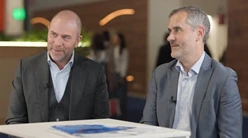CEOs see new era of technology to sustain energy abundance
The second day of the strategic conference at ADIPEC brought together five chief executives to consider the ‘tech imperative’, sharing their insights on how industry leaders are adapting to technology that is rapidly transforming the energy landscape.
Their discussion was preceded by a surprise on-screen appearance of Bill Gates, who urged ADIPEC delegates to strive toward maximising human welfare as they make progress on technologies to reduce carbon emissions.
“I am optimistic that with innovation we will decarbonize, and leadership will be key in deploying the technologies,” said Gates.
The job of a leader is not just to prolong what is happening today, but it is really about making the things happen that wouldn't have happened otherwise.
Making things happen
Alfred Stern, Chairman of the Executive Board and CEO, OMV, set the tone for the conversation from his perspective as head of an integrated oil, gas and petrochemical company.
“It's clear that we will need more energy tomorrow,” he said. “We know from history that the energy of tomorrow will look different from the energy of today.”
“The job of a leader is not just to prolong what is happening today, but it is really about making the things happen that wouldn't have happened otherwise.”
Stern discussed his company’s objective to run its refineries more efficiently, deploying the newest technologies. He also discussed the important vector of materials technologies.
“I think there's a lot of space in energy technologies and in material technologies, and leadership is critical, because otherwise, we just stay in the comfort zone.
“We have to push our organisations out of the comfort zone.” Lorenzo Simonelli, Chairman & CEO, Baker Hughes, spoke of the relevance of collaboration for the adoption of new technologies.
“We see ourselves as being at the interconnectivity between the energy and the industrial world, relative to providing technologies, and that comes down to collaboration.”
All technologies are going to be needed in the current situation, which is probably the biggest transformation of the power system, of the energy system, that we have lived in a century.
He noted that the adoption of technology occurs over time, and with the application of AI, it's power that's going to be knowledge.
“So collaboration is key, and I think all of us in this room have known that for some time,” he said.
Data revolution
Dr. Pratima Rangarajan, CEO, Climate Investment, focused on the concept of the fourth industrial revolution or data revolution.
“We should look back at this time to learn from the other three revolutions,” she said. “And when we look back, we see the greatest value actually is generated during these revolutions, but there are winners and losers.”
“We're talking about technology, and technology is a catalyst for these revolutions,” she said.
“It's about the companies that are willing to get out their comfort zone and deploy the technologies in unusual ways to get the alpha in value right.”
Mavi Zingoni, CEO, Power, GE Vernova, also offered insightful perspective on the current times.
“All technologies are going to be needed in the current situation, which is probably the biggest transformation of the power system, of the energy system, I'd say that we have lived in a century,” she said.
“I've been in this sector for more than 20 years, in upstream and downstream power the last seven years, and I haven't seen the acceleration of the demand that we are seeing right now.
“We're moving into a world of the of electricity, which is probably 20% of the total energy system and will move to somewhere 30% to 50% in the next 20 years.
“But this electricity still depends on the molecules, and that's why we need to think of so together.”
Delivery certainty
Alessandro Puliti, CEO, Saipem, discussed his company’s strategy to, as he said, “navigate into the uncertainties.”
“The key, let's say competitive proposal, is certainty of delivery,” he said.
“I cannot take away geopolitical risk, I cannot take away any kind of risks that are coming outside of our control, but what it is in our control is the delivery of the project.”
“That's what we do, and we do it in all the business, either onshore, offshore drilling, but even when it comes to sustainable infrastructure.”
It's about the companies that are willing to get out their comfort zone and deploy the technologies in unusual ways to get the alpha in value right.





